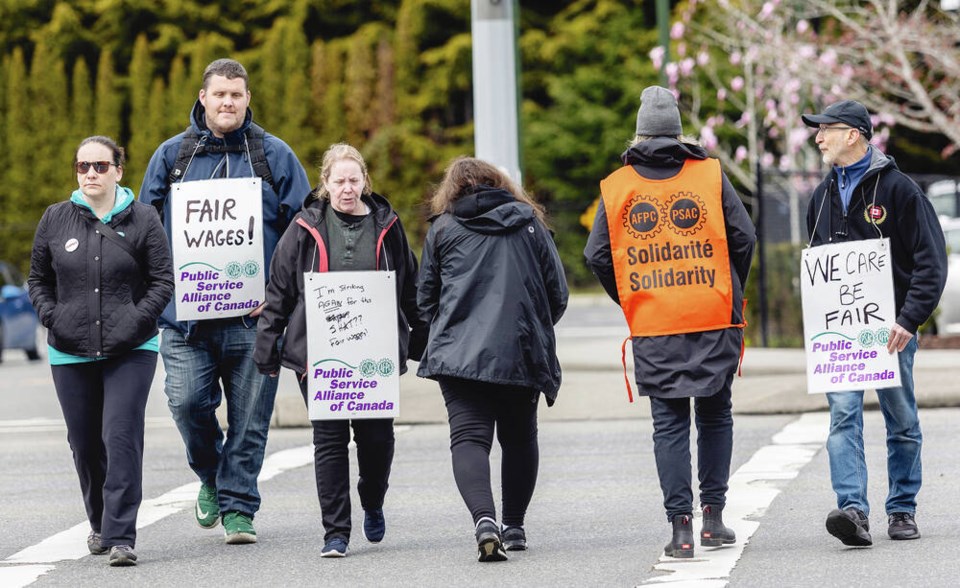A commentary by a retired business leader who has been a director of five global corporations.
After more than two weeks of shutting down virtually all federal government services, 120,000 of the picketing workers returned to work on Monday. The Public Service Alliance of Canada walkout had been brewing since last fall, when PSAC president Chris Aylward declared: “The government can’t expect workers who have been getting us through the pandemic to shoulder the costs of Canada’s recovery.”
Shoulder the costs of Canada’s recovery? Aylward’s PSAC members not only were paid full salary during the pandemic but also thereby added two more years to their generous pension benefits.
What about all the private-sector workers who either lost their jobs or were forced to work part-time for lower wages and fewer or no benefits? Statistics Canada’s Labour Force Survey shows that in the 2020-2022 two-year pandemic period all of the country’s 206,000 job losses were private-sector workers, while public-sector employment increased by 305,000.
The most rapid growth was federal. Government of Canada data show the federal public service now employs more than 336,000 people. As Jack Mintz of the University of Calgary has said, annual federal employee compensation has risen from $38 billion to $58 billion since the Trudeau government gained power in 2015.
A recent Fraser Institute study, using data for the pandemic year 2021, found that government-sector workers enjoyed a 5.5 per cent wage premium over private-sector workers even after controlling for differences in education, experience, unionization and other labour market factors.
The benefits disparity is much larger: more than 86 per cent of government workers are covered by a registered pension plan compared with just 23 per cent of private-sector workers. Government workers are much less likely to lose their jobs and take five more days off for “personal reasons” than private-sector workers. Moreover, they’ve retired more than two years earlier, most likely because of their generous pensions.
PSAC was determined to increase that public/private compensation disparity with wage increases of 4.5 per cent in each of the next three years. But even that wasn’t enough for the 35,000 Canada Revenue Agency workers who remained on strike demanding a staggering 7.5 per cent per year. I guess that was to compensate them for “taxing” their brains pushing the keys on an almost fully automated tax return system.
No wonder Conservative Leader Pierre Poilievre observed during Question Period that “It’s one thing to increase the size and cost of the public service … and another thing to be faced with a massive strike by public servants … but it is an especially incredible achievement of incompetence to do both of those at the same time.”
Normally, PSAC’s excessive demands would have been tempered by the possibility of back-to-work legislation, but the NDP’s support of PSAC’s demands made the chances of that virtually nil. That put the Trudeau government between the proverbial rock and a hard place: either leave government services that people count on shut down or agree to a settlement that adds many more billions to already perilously dangerous deficit spending.
In the end, the union’s demands were met, but dressed up in different clothes. Rather than the 13.5 per cent over three years, settled for a nominal 11.5 per cent over four years, but retroactive to 2021 and added a 0.5 per cent special adjustment for 2023.
The union’s website shows a total wage increase of 12 per cent, with 9.5 per cent coming immediately.
But that’s not all. PSAC members will also receive a “pensionable $2,500 one-time lump sum payment that represents an additional 3.7 per cent of salary.” A few days later, Canada Revenue Agency employees settled on basically the same terms plus a fourth year adjustment contingent inflation adjustment.
Moreover, the union gained a protection against contracting out provision designed to “protect public service jobs and reduce contracting out in the federal public service.”
It’s hard to comprehend how the settlement could have been worse, both for taxpayers and for increasing the already dangerous disparity between public and private sector workers. As public-sector workers try to justify their excessive wage demands, private-sector workers struggle with the rising cost of groceries and other necessities.
These are the same private-sector workers whose taxes pay the cost of the public service. But it has become quite clear that PSAC workers just don’t care, a shamefully selfish behaviour that tears dangerously at the fabric of our nation.
The worst may be yet to come. A Government of Canada website lists 32 federal and provincial union contracts due to expire in 2023, covering a total of 99,000 workers.
Those unions have been waiting for the PSAC settlement to set the benchmark. I’m sure they’re delighted with the outcome. The result is certain not only to expand the already dangerously disparate compensation of public- and private-sector workers but also significantly accelerate the very inflation the unions claim justify their rich wage demands.
This is a dangerous time for our country. We have a federal government that sinks the nation further and further into debt with profligate spending and hobbles the resource industries that provide much of our GDP and export revenue.
It is kept in power by a deeply socialist party whose sole agenda is to blackmail the minority Liberals into expanding social welfare programs that are already unaffordable. And now we have clear evidence that members of our largest public-sector union just don’t care about the fellow Canadians who pay their wages.
Our prime minister talks constantly about environmental sustainability. The real question is the social and economic sustainability of the course he has plotted for our beleaguered nation.
>>> To comment on this article, write a letter to the editor: [email protected]



